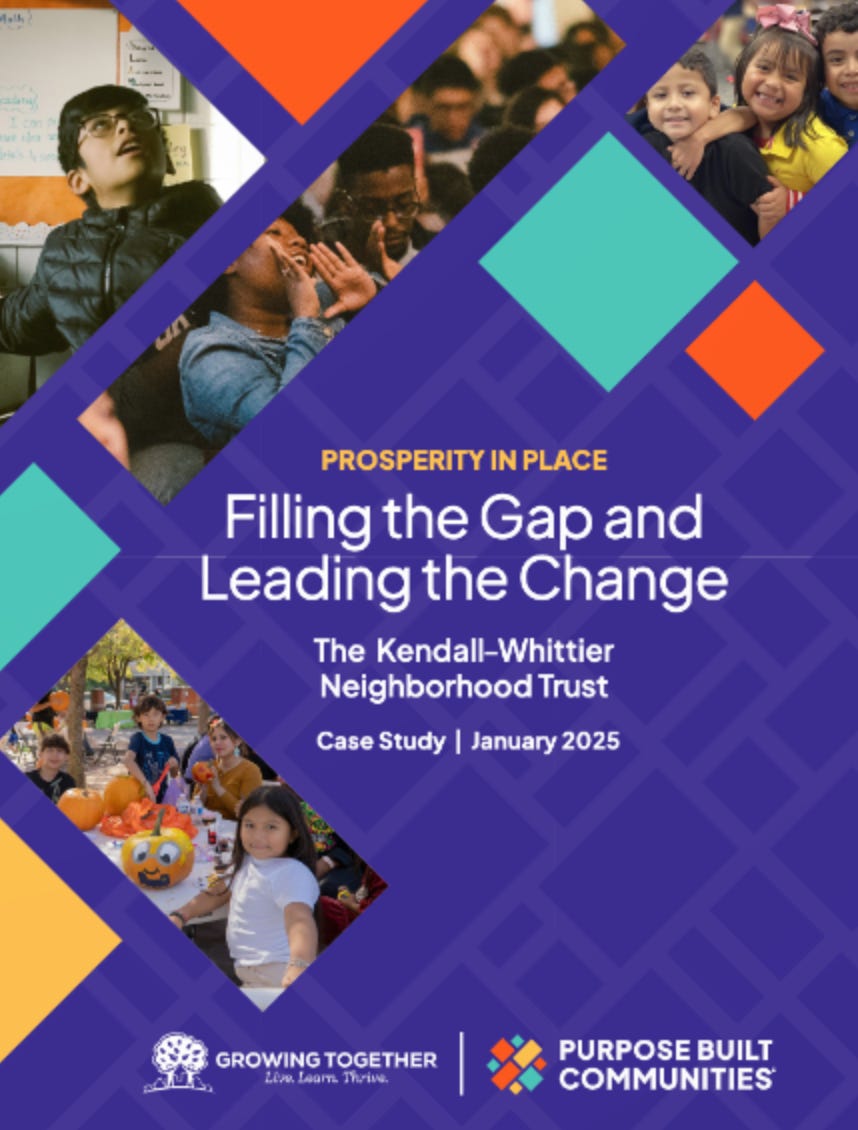Q1 2025: Beginning our Fifth Year with Trusts & Trust
“We believe MINTs can be a ladder of trust that builds from the hyperlocal”
Celebrating 5 Years of Impact
This is the first newsletter of Trust Neighborhoods’ 5-year anniversary year! As we approach our official fifth birthday this August, we’re taking time to reflect on our journey and look forward to future impact. We want to hear from you as we celebrate this milestone – share your thoughts in our anniversary survey at the end of this newsletter!
Milestone: Five Years, Five MINTs
We’re proud to begin 2025 with five Mixed-Income Neighborhood Trusts (MINTs) operating across the country. Through steady acquisitions, renovation work, and matching residents facing displacement with stable homes, the MINTs are entering the year in a position of strength:
Learning from Tulsa with Purpose Built Communities
Purpose Built Communities recently released a case study this year on the Kendall-Whittier Neighborhood Trust (KWNT) in Tulsa. It highlights how our neighborhood partner, Growing Together, has implemented the MINT model to advance Purpose Built’s work to create “an America where every neighborhood is a pathway to opportunity and prosperity.”
Read the complete case study here: https://purposebuiltcommunities.org/kwnt-case-study/
Kavya and Cali on our team will present this work alongside the KWNT team at the Purpose Built Conference in Houston (April 29 - May 1).
Key findings particularly stand out to us:
Cross-subsidy in action: we’re seeing early evidence of our thesis on cross-subsidization playing out in Tulsa, with unrestricted market-rate units helping to fund preservation of affordability in other units
Supporting families: not only is the MINT using cross-subsidy, but some of the higher renting units are cross-subsidizing larger family-sized units preserved further below today’s market-rates
Evaluation as self-knowledge: Purpose Built’s engagement with KWNT partners revealed stories of deep alignment among contractors, board members and others that were new even to us. This builds on one of our lessons from this past year with New Profit: that evaluation can serve as both long-term impact measurement and as a way to create more immediate self-knowledge for all stakeholders in MINTs
Welcoming our newest team member
We’re thrilled to welcome Olivia Simpson to our team as our newest Project Manager!
Olivia brings a strong combination of technical expertise in housing policy, finance, and development alongside a deep dedication to building community power. Her experience includes:
As a Fellow at New Jersey Community Capital, she supported neighborhood organizations to develop actionable strategies and unlock state funding to address housing quality and affordability. She then advanced affordable housing and redevelopment projects across her home state of North Carolina at Self-Help, a national community-development credit union.
Most recently, at HR&A Advisors, Olivia designed and underwrote affordable housing finance and funding strategies for local governments and impact investors across the country. Olivia holds a BA in Sociology from Duke University and a Masters in City and Regional Planning with a concentration in Housing, Land and Finance from Rutgers University. We’re lucky to have Olivia as part of our team, working alongside our neighborhood partners on strengthening and growing MINTs across the country.
We’re hiring!
We’re continuing to grow our team! We're adding a Senior Operations Manager to the Trust Neighborhoods team. We're looking for a new team member to build and maintain the systems that support our growing team and network of MINTs.
Please see here for the job description and information on how to apply. Applications will be reviewed on a rolling basis starting May 5.
Sharing from the team retreat
Our full team recently gathered in Kansas City for an in-person retreat, spending valuable time with the Northeast Neighborhood Trust team, and stepping back from day-to-day work to tackle strategic questions. A few key focus areas included:
Impact evaluation frameworks for current and future MINTs
Capital market strategies to support continued growth with existing and future investors in MINTs
Proactive public partnership ideas for targeting problem landlords, building on the meaningful and successful work of existing MINTs, such as East Colfax MINT, or St. Louis’ current opportunity working closely with Legal Services to knock out a large awful landlord in their neighborhood
Surfacing asks we’ve seen from partners to expand the scope of the MINT model and dream big on ways MINTs can be meaningful beyond their current work
Wrapping our Catalyst year with New Profit
In February, we completed our year as part of New Profit’s Economic Mobility Cohort. A few example takeaways included:
Expanding Trust Neighborhoods’ board: we both analyzed and worked with New Profit on strengthening our governance for Trust Neighborhoods, and are exploring changes such as adding a MINT representative to the TN Board to further strengthen our accountability to serving MINTs and our partners
Evaluation as feedback alongside measurement: approaching evaluation not just as a measure of long-term impact, but also as a strategic function surfacing continuous feedback and value for the MINTs, partners, and TN
Aligned peers & friends: we found a tremendous cohort of 15 peers also building towards scale with their own nonprofit work on economic mobility
The Unlocking Ownership Fund invests in TAB
We’re proud to announce the Unlocking Ownership Fund’s participation in the Trust Neighborhoods Acquisition Bridge (TAB) facility. This partnership comes out of our learning about how crucial rapid acquisition capital is for getting properties off the market and into community-governed control.
As Delta Fund, one of the LPs and founders of the Unlocking Ownership Fund, wrote when sharing their participation:
“For us, the answer is clear: we want to build a society where more people have economic stability and genuine power over their communities' futures. We want to see families achieving durable financial stability instead of living paycheck to paycheck. We want vibrant neighborhoods where residents shape development rather than being displaced by it.”
Help shape our 5-year anniversary
As we celebrate five years of Trust Neighborhoods, we want to hear from you! How has our work impacted your understanding of neighborhood change? What would you like to see from us in the next five years? What would you like to see from us this year around our five-year anniversary?
We’re considering more regular sharing of data, stories, and our team philosophy on specific aspects of our work around the anniversary. What would be most interesting and valuable to you?
Thank you
Thank you for your continued support of Trust Neighborhoods and the MINT model. Together, MINT by MINT, block by block, we’re building a new approach to housing stability, neighborhood benefit, and community power that benefits everyone.
We’ve had a number of new donors and major new gifts from existing donors as we begin this anniversary year. We want to say a special thank you to the Marguerite Casey Foundation, who just came forward with an additional major gift, and Arrow Impact, which just made a major additional gift and their first multi-year commitment to Trust Neighborhoods.
Thank you to all of our supporters for making this work possible!
Deep Dive: Trusts & Trust
We recently applied for Reid Hoffman’s Trust in American Institutions Challenge through Lever for Change. This opportunity allowed us to articulate how MINTs build trust, something that’s central to our work and embedded in our name, but something we do not typically have a chance to share as we are often focused on emphasizing housing affordability, neighborhood benefit, and community power building.
So we want to take this deep dive as an opportunity to share how we think of MINTs driving trust. It’s core to what we do; it is literally in our name, and the name of every MINT.
How MINTs build trust, community power, and enduring belonging:
We’ve spoken of the broken social contract we see in so many American neighborhoods. In gentrifying neighborhoods across America, residents face a painful paradox: making your neighborhood a better place to live often means you can no longer afford to live there.
This broken social contract manifests as well intended public and philanthropic institutions invest in better schools, transit, parks, and services and inadvertently trigger displacement rather than using those improvements and higher opportunity to benefit existing residents. When this happens, residents rightly learn to distrust rather than welcome institutional engagement in their communities.
MINTs directly take on this trust deficit, and instead build trust in three key ways:
First, they transform power dynamics: MINTs create legal structures that put residents—especially renters historically excluded from decision-making—in positions of authority through Perpetual Purpose Trusts. Residents get that traditional community engagement merely solicits input; MINTs establish durable institutions where residents have real power over real assets through seats on MINT governance boards and committees.
Second, MINTs harness neighborhood change: Through their mixed-income approach, MINTs capture rising property values to permanently fund affordability. That flips the dynamic of rising rents leading to displacement and instead uses higher rents to fund long-term affordable housing.
Third, MINTs build institutional bridges: through MINTs, residents can engage with public and private institutions from positions of strength rather than vulnerability. When residents work with the city, state, or other institutions, they are coming from places of real power by managing valuable community assets.
We believe MINTs can be a ladder of trust that builds from the hyperlocal level. Reid Hoffman spoke of this in the prep webinars in an echo of Alexis de Tocqueville: trust in American institutions first takes root in local associations then builds up. It’s part of why our logo is both housing and an arrow up, building trust from the bottom up and up.
By changing who changes our neighborhoods, and changing this painful paradox of disinvestment or displacement into an opportunity for strengthening trust, MINTs aren't just about housing, affordability, and belonging—they're rebuilding foundational relationships between citizens and institutions that American democracy so urgently needs to thrive.






